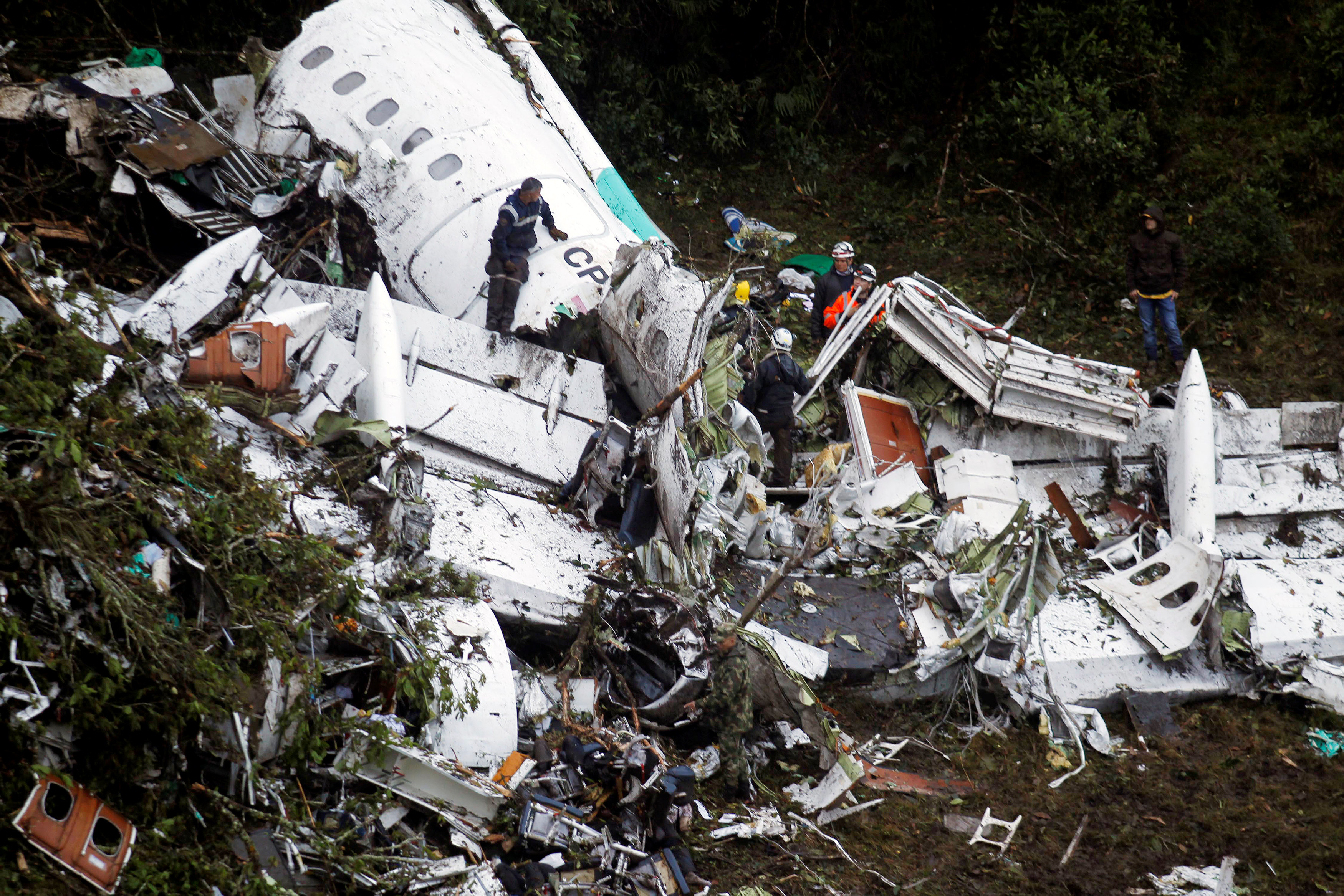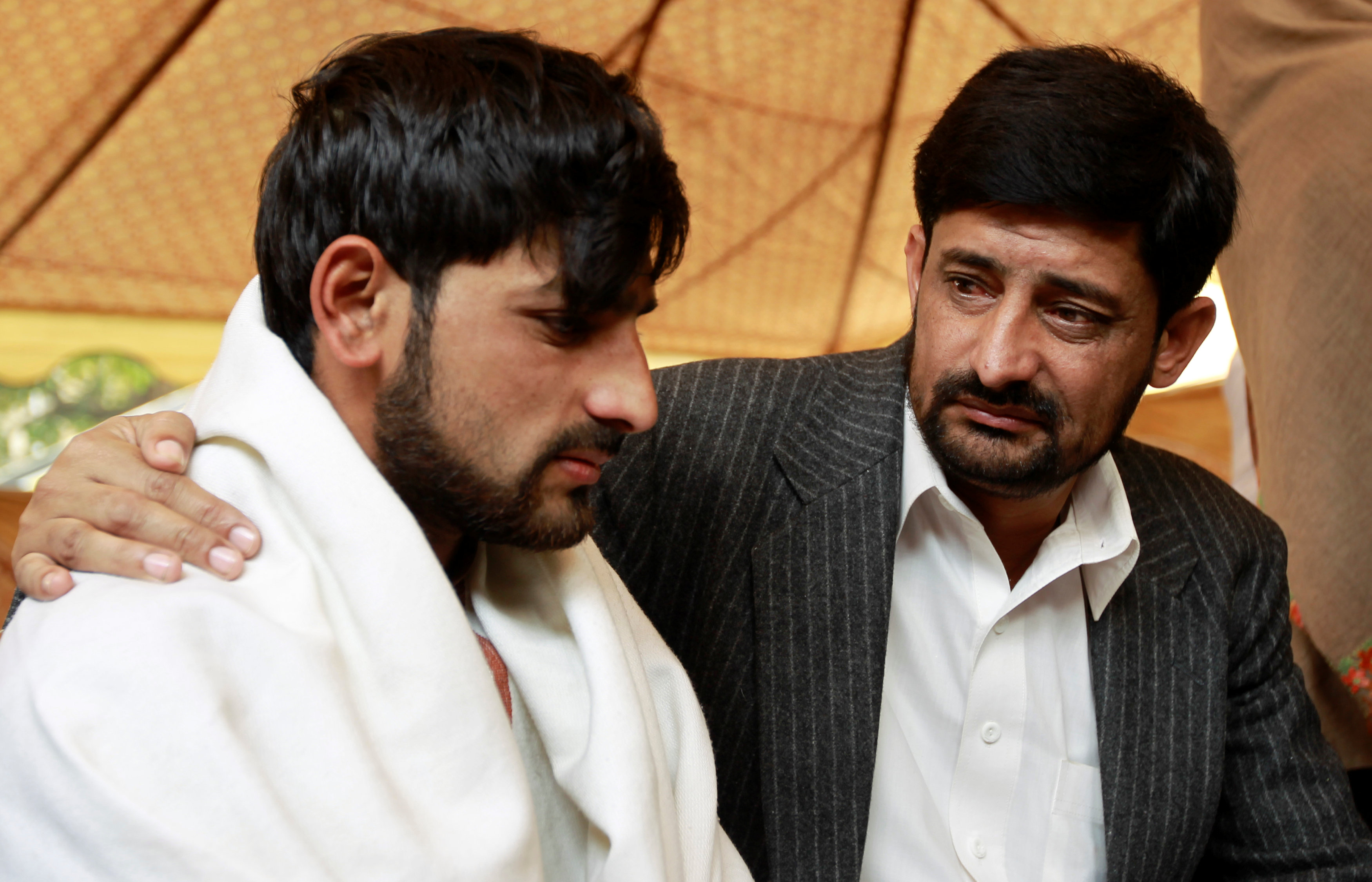
By Fredy Builes and Paolo Whitaker
LA UNION, Colombia/ CHAPECO, Brazil (Reuters) – A charter plane carrying Brazilian soccer team Chapecoense to the biggest game in its history crashed in the Colombian mountains after an electrical fault, killing 75 people on board, authorities said on Tuesday.
Colombia’s worst air disaster in two decades came as the team from Brazil’s top soccer league flew to face Atletico Nacional of Medellin in the first leg of the Copa Sudamericana final, South America’s equivalent of the Europa League.
The plane, en route from Bolivia where the team had a stopover, went down about 10:15 p.m. on Monday night with 72 passengers and a crew of nine on board.
It had reported electrical problems and declared an emergency minutes earlier as it neared its destination, Medellin airport officials said.
At the crash scene near the town of La Union in wooded highlands outside Medellin, dozens of bodies were laid out and covered with sheets around the wreckage of the BAe 146.
The plane was shattered against a mountainside with the tail end virtually disintegrated. Rain hampered dozens of rescuers as they combed the muddy and forested area.

Rescue crew work in the wreckage from a plane that crashed into Colombian jungle with Brazilian soccer team Chapecoense near Medellin, Colombia, November 29, 2016. REUTERS/Fredy Builes
Colombia’s civil aviation head, Alfredo Bocanegra, said there were 75 confirmed fatalities, with six injured survivors. They were listed as three players, a journalist and two members of the flight crew. Two of the six were in grave condition.
It was the first time Chapecoense, a small club from the southern Brazilian town of Chapeco, had reached the final of a major South American club competition.
Brazilian news organizations said 21 journalists had been on board the plane to cover the match.
Global soccer was stunned, matches were canceled around South America, and Brazil declared three days of mourning.
“I express my solidarity in this sad hour during which tragedy has beset dozens of Brazilian families,” President Michel Temer said.
Colombian President Juan Manuel Santos tweeted his condolences. “Solidarity with the families of the victims and Brazil,” he said.
Colombia’s civil aviation authority named the survivors as players Alan Ruschel, Jackson Follmann and Hélio Neto; journalist Rafael Valmorbida; air stewardess Ximena Suarez and flight technician Erwin Tumiri.
Flight tracking service Flightradar24 said on Twitter the last signal from flight 2933 was received when it was at 15,500 feet (4,724 m), about 30 km (18.64 miles) from its destination, which sits at an altitude of 7,000 feet (2133 m).
The BAe 146 was produced by a company that is now part of the UK’s BAE Systems
The team flew Brazilian airline Gol to Santa Cruz in Bolivia and then took a flight from there to Medellin on the plane run by a Bolivian-based, Venezuelan-owned company called LaMia.
GLOBAL SOCCER WORLD SHAKEN
The crash evoked memories of a series of soccer air disasters in the 20th century, including the Munich crash in 1958 that killed 23 people, including eight Manchester United players, journalists and traveling officials.
World governing body FIFA said on Twitter its “thoughts were with the victims, their families, fans of Chapecoense and media organizations in Brazil on this tragic day.”
Chapecoense qualified for the biggest game in its history after overcoming the Argentine club San Lorenzo in the semi-final on away goals following a 1-1 draw in Buenos Aires and 0-0 draw at home.
They were underdogs for the match against a club going for a rare double after winning the Copa Libertadores in July.

Fans of Chapecoense soccer team are pictured in front of the Arena Conda stadium in Chapeco, Brazil, November 29, 2016. REUTERS/Paulo Whitaker
Chapecoense was the 21st biggest club in Brazil in terms of revenue in 2015, bringing in 46 million reais ($13.5 million), according to a list by Brazilian bank Itau BBA.
The club has built its success on a frugal spending policy that eschewed big money signings and concentrated on blending young talent and experienced journeymen.
“They were the hope of our city,” said Jean Panegalli, 17, a student in Chapeco. “They played for love of the shirt and not for money. They played with the commitment that only those who have lived here know.
“They were ferocious.”
Several hundred dejected fans gathered around the team’s Conda stadium in Chapeco, many of them wearing Chapecoense’s green strip. At least one young fan burst into tears
“It is still hard to believe what has happened to the Chapecoense team just when it was on the rise,” said Agenor Danieli, a 64-year-old pensioner in the agricultural town of around 200,000 people in Santa Catarina state.
“We are in crisis. The town has come to a stop. Companies are giving people the day off so they can come here to the stadium. We need to pray. It still doesn’t feel real.”
Chapecoense’s best-known player was Cleber Santana, a midfielder whose best years were spent in Spain with Atletico Madrid and Mallorca. Coach Caio Junior also was experienced, having managed at some of Brazil’s biggest clubs, Botafogo, Flamengo and Palmeiras among them.
The crash prompted an outpouring of solidarity and grief on social media from the soccer community, with Brazilian top flight teams Flamengo and Santos tweeting messages of support.
Porto goalkeeper Iker Casillas tweeted: “My condolences for the plane accident that carried @ChapecoenseReal. Tough moment for football. Good luck and stay strong!”
The South American football federation suspended all games and other activities following the crash.
It was Colombia’s worst air accident since more than 160 people on an American Airlines plane died in 1995 in a mountainous zone near Cali.
($1=3.40 reais)
(Writing by Julia Symmes Cobb and Andrew Cawthorne; Additional reporting by Helen Murphy, Julia Symmes Cobb and Luis Jaime Acosta in Bogota; Andrew Downie, Anthony Boadle and Dan Flynn in Brazil, Girish Gupta in Caracas; Tim Hepher in Paris; Editing by Andrew Cawthorne and Kieran Murray)













